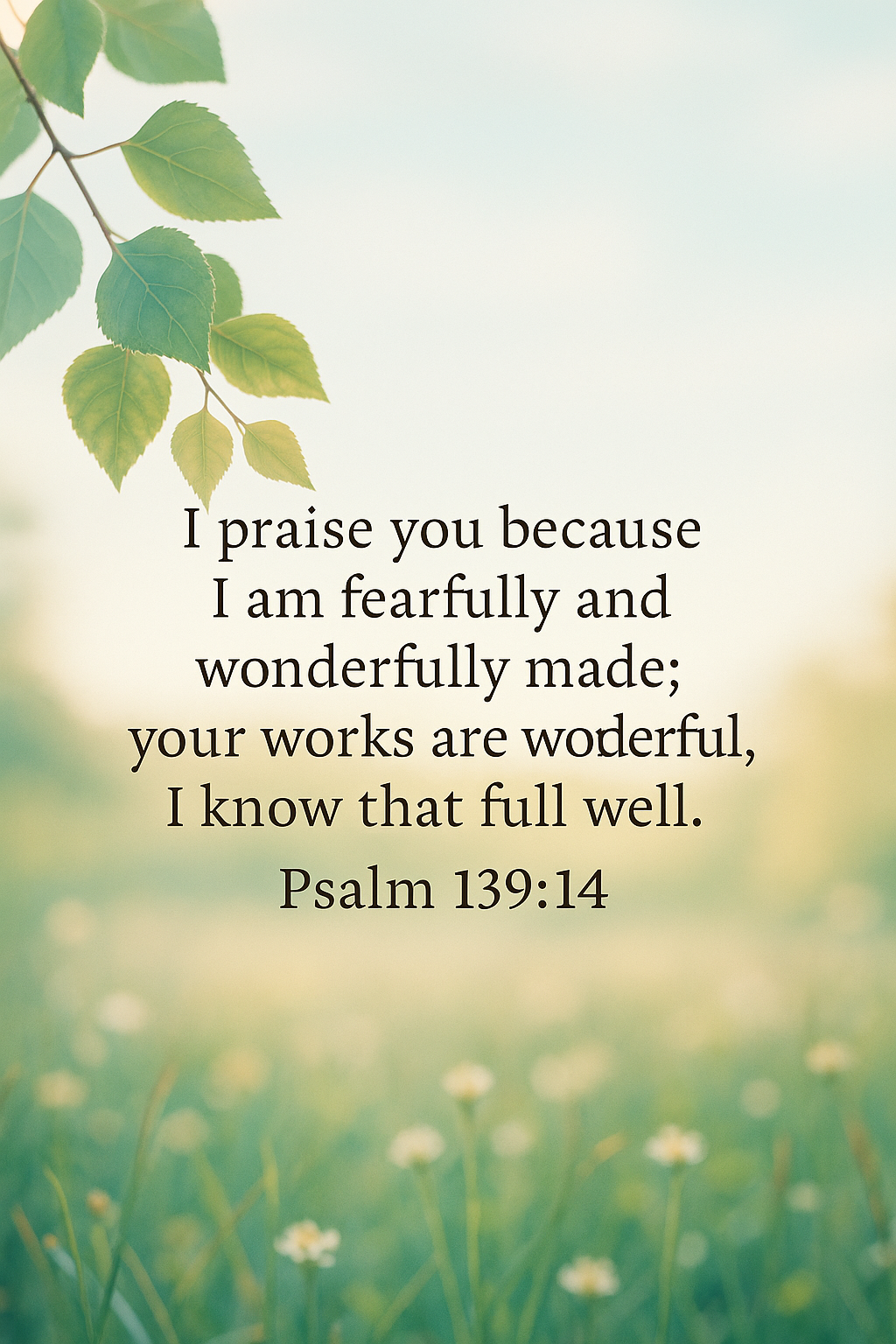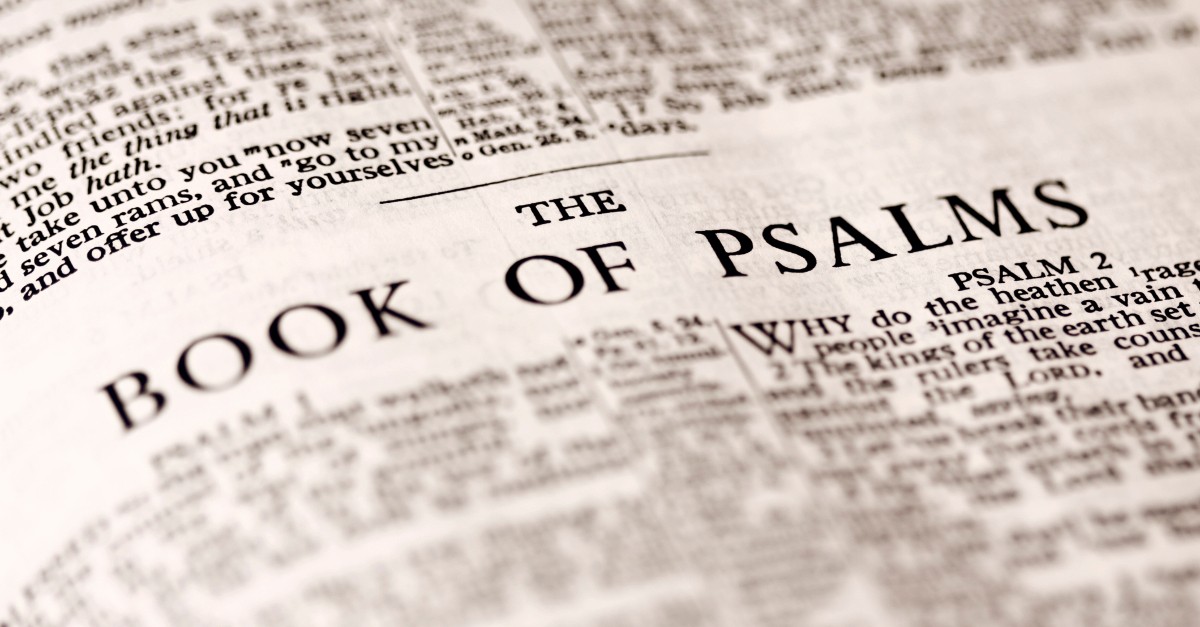
Psalm 139 contains a famous verse: “I praise you because I am fearfully and wonderfully made; your works are wonderful, I know that full well.”
We use these words in various contexts, whether with children or for other causes. It encourages us and teaches our inherent value. Yet this verse doesn’t occur alone. The writer places the truth of our intrinsic value within the greater reality of God’s identity and power. Exploring Psalm 139, we see our worth and why God sent his Son to redeem us.

Let’s explore Psalm 139 more to see what God has to say about our identity and how it is ultimately rooted in him.
Photo credit: ©Getty Images/solarseven

Who Wrote Psalm 139?
Psalm 139 states begins with: “For the director of music. Of David. A psalm.” King David, the shepherd boy who became king, wrote many praise songs. The Bible declares David a “man after God’s own heart” (1 Samuel 13:14), and as a warrior and worshipper, his rule and reign marked a new redemptive plan for God to bring a savior.
Although we don’t know the exact date, David probably wrote Psalm 139 while king. David encountered conflict and war throughout his life and reign, and the song shows how he seeks comfort in God’s identity, power, and justice. The final verses especially imply persecution from wicked men, and David remembers God’s faithfulness and justice in response.
Psalm 139 uses ancient Hebrew poetic parallelism. It divides into four main movements, from God’s knowledge of a person, his presence, his creative power, and a call for divine justice and personal righteousness. Like many of the Old Testament psalms, Psalm 139 expresses common themes like God’s care through the covenant, the value of life, and a call to holiness. It combines the truth of God’s transcendent sovereignty with his intimate care of every person.
Photo credit: ©Getty/CaseyHillPhoto

What Are the Key Themes in Psalm 139?
We can organize the psalm around 4 main themes.
1. God Knows Everything About Us
David begins with a declaration of God’s absolute knowledge. “O Lord, you have searched me and known me! You know when I sit down and when I rise up; you discern my thoughts from afar.” (verses 1-2) God not only sees our actions and hears our words, he knows our thoughts and motives before we even speak. “Even before a word is on my tongue, behold, O Lord, you know it altogether.” (verse 4) Nothing is hidden from God. All has been laid bare before his omniscience.
God sees every action from every person, and yet, despite this sweeping knowledge, he searches us personally, aware of every detail in our lives. The truth causes David to be in awe and wonder. “Such knowledge is too wonderful for me; it is high; I cannot attain it.” (verse 6) God has both universal and personal sight, far beyond our comprehension. The transcendent proves his power; the personal shows how much he loves us.
2. God is Present with Us
Not only does he know everything, God is also everywhere, omnipresent. “Where shall I go from your Spirit? Or where shall I flee from your presence?” (verse 7) David expresses how, even if he should go to the highest heavens or into the depths of death, the pit, he can find God’s presence there. “If I ascend to heaven, you are there! If I make my bed in Sheol, you are there!” (verse 8) David’s understanding would have considered the heavens the sky or the spiritual unseen, and Sheol was the place of death, a dark sleep. And yet even on earth, God’s presence inhabits the farthest reaches, “the uttermost parts of the sea.” (verse 9) In every place, David could turn to God and encounter him.
God’s presence brings both conviction and redemption. God sees all, knows all, and is always present, convicting us to live under his guidance and love. His presence brings redemption because he is light, overcoming all darkness. “Even the darkness is not dark to you; the night is bright as the day, for darkness is as light to you.” (verse 12) In seasons of crisis, his presence brings light and insight to us.
3. God Formed Us in the Womb
The same God who spoke light into existence carefully crafted each person, and David remembers him as a personal creator. “For you formed my inward parts; you knitted me together in my mother’s womb.” (verse 13) Because God created us, he did so with intention, design, and purpose. No person is an accident.
David praises God for forming him with such miracle and value. The same God who spoke creation into existence took special care to make every person. “I praise you, for I am fearfully and wonderfully made. Wonderful are your works; my soul knows it very well.” (verse 14) David doesn’t self-exist; no one does. As Creator, God becomes the source of being and purpose. “Your eyes saw my unformed substance; in your book were written, every one of them, the days that were formed for me.” (verse 16) The language reflects God’s intentional care in Genesis 1, the earth being without form, and God chose to fill it with good things and himself. The Father does the same on the personal level he did on the cosmic—he writes a good plan for each person’s life. David’s praise reveals the value God places on us.
4. Call for Righteousness and Justice
Psalm 139 seems to shift focus toward the end, as David calls for God’s justice against evil. “Oh that you would slay the wicked, O God!” (verse 19) The king shows sorrow for those who hate God and oppose him. Those who hate God, David also counts as his enemies (verses 21-22). While this appears out of context, God’s love includes his justice. The Lord took such care and wonder in creating people, and evil destroys those individuals, twisting God’s good purpose. God therefore resists the proud and evil for the sake of good and love.
At the same time, we see David’s humility. He cries out for God to help him not be like the wicked. He turns the truth back upon himself. “Search me, O God, and know my heart! Try me and know my thoughts!” (verse 23) God’s holiness demands purity, not only in the “wicked” but the king, as well. No one stands above this reality. David submits himself to God, to “see if there be any grievous way in me, and lead me in the way everlasting.” (verse 24)
Worshipping God as sovereign, transcendent, personal, and loving leads to our humility and obedience.
Photo credit: ©iStock/Getty Images Plus/mik38

What Does "Fearfully and Wonderfully Made" Mean?
The original Hebrew word yare’ is translated to “fearfully.” Yare’ means to stand in reverent awe. Not fear in the “shaking in my boots” sense, afraid of punishment, but an awe for something so amazing it provokes ultimate humility and praise. Like seeing a sunset from the mountains, it makes us feel small and privileged all at once. God’s work in forming a person is so phenomenal it causes overwhelming wonder.
The word “wonderfully” comes from the Hebrew word palah, which refers to something set apart as marvelous. God creates each person to be distinct, unique, something no one has seen before, a new wonder. The Father constructed, formed, and designed every person with purpose and detail, even planning out a good life in advance. The apostle Paul writes this same truth about each believer. While we are saved by grace through faith, not by works, we were saved for them. “For we are God’s handiwork, created in Christ Jesus to do good works, which God prepared in advance for us to do.” (Ephesians 2:10)
Despite the struggles many face, the lies told by the devil and the world, each human life is an intentional and amazing masterpiece of God. We were fearfully and wonderfully made with care, set apart for a purpose, and given inherent meaning. From this truth, we praise him for how he loves us, and we endeavor to treat others in the same way, as image bearers worthy of dignity, including the unborn.
Photo credit: Zach Lucero/Unsplash

How Does Psalm 139 Teach the Value of All Life?
David writes how God “knitted” him together in his mother’s womb. This work of God began before birth. In context with “fearfully and wonderfully made,” God’s artistry for every person happened in the womb, deliberately and lovingly.
This basic truth leads to biblical teaching about compassion, generosity, and justice. Since all people reflect God’s image, believers must treat each other with respect and love, regardless of race, ability, or status. With this dignity in mind, Jesus served the poor, healed the sick, and called his disciples to love self-sacrificially. The early church in Acts took his teachings literally, as intended, and provided for every physical and spiritual need. Christian generosity doesn’t happen out of pity or superiority but because every person is “fearfully and wonderfully” made in God’s image. We honor God when we treat people with dignity.
Psalm 139 clearly extends such intrinsic worth to a child in the womb, the same as everyone else. We see such activity and personality when John the Baptist recognized Jesus while in the womb. Mary, pregnant with Jesus, visited her cousin, Elizabeth, who was pregnant with John. Elizabeth’s baby leaped in her womb (Luke 1:41). Filled with the Spirit, Elizabeth testified that baby John responded with joy at the Son of God. This revealed God’s plan for John even before birth—to declare the coming of the Messiah (Luke 1:15). Even in the womb, John responded to God.
Psalm 139 calls us to see all human life—our own and others’—as worthy of protection and love.
Photo credit: ©Iamngakan Eka/Pexels

How Does Psalm 139 Connect with the Gospel of Jesus?
Psalm 139 expresses the overwhelming worth and beauty God instils in each person. We know something’s value based on what people pay for it. God valued humanity so much, he gave the best he had, his Son. “For God so loved the world that he gave his one and only Son, that whoever believes in him shall not perish but have eternal life.” Sin had corrupted us, lied to us about God’s love for us, and led us on a destructive path. Jesus came to rescue us from that destiny. He took the consequence we deserved and rose again to give new life to those who will believe.
As Psalm 139 ends with a cry for God to lead us into the “way everlasting,” and away from wickedness, God answers King David’s call through the Son of David, the Messiah. Christ redeems us from the curse and sin and restores us to the path he designed from the beginning. Now restored, we can live the story the Father wrote for us: to live for his glory and to reflect his image in the world, each in our unique way.
All people have this value, so we join God in his purpose to rescue others. In the Son, the Father didn’t only deliver us from hell, he saved us for himself and a greater purpose. Through Christ, we affirm our wonderful value and become who we were always meant to be, the beloved children of God in the way everlasting.
Photo credit: ©Getty Images/Boonyachoat

Originally published Friday, 06 June 2025.
